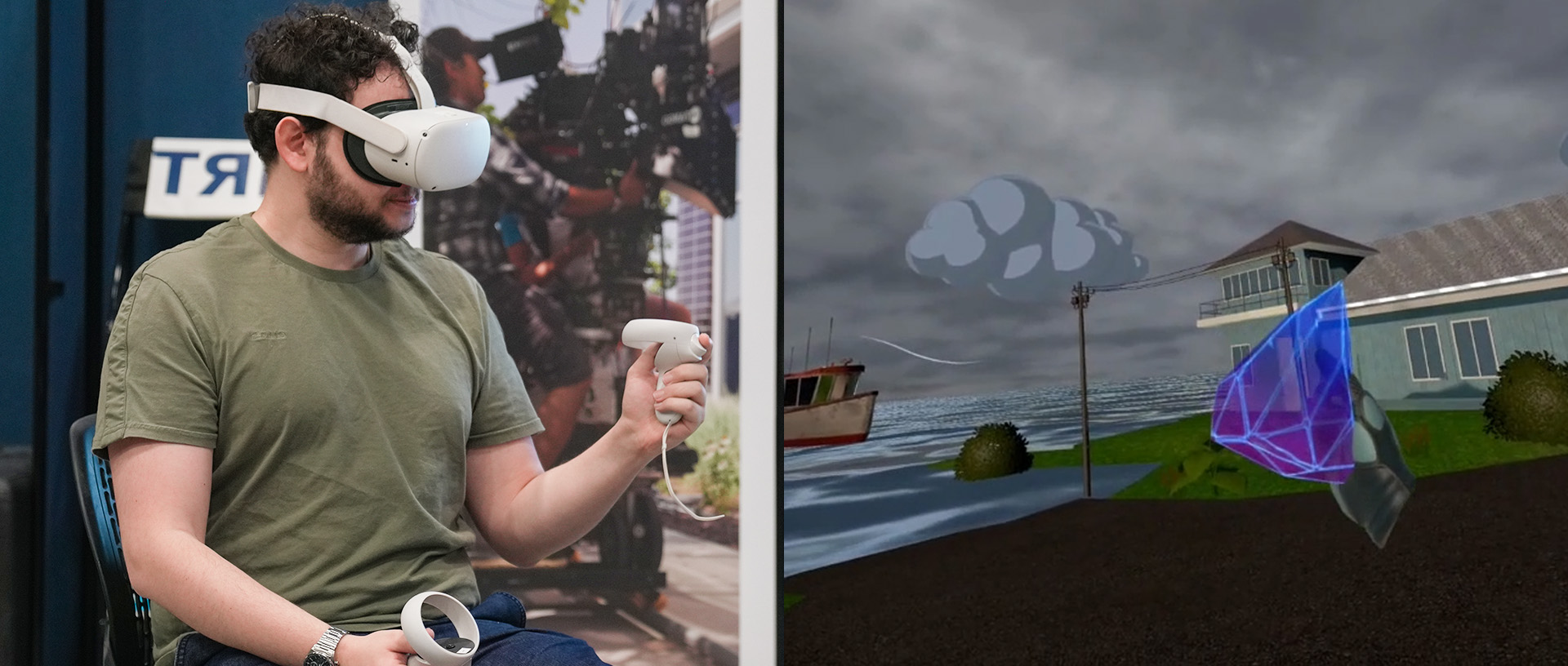
Virtual Reality for Social Impact
Research Team
Kevin Santos
Valentina Bachkarova
Parker Christie
Partners
Oakville Community Foundation (OCF)
Mobilize Seed
Impact
- Importance of Climate Action.
- VR Experience development.
- Increasing capacity to support social change.
Leveraging Immersive Technology to Advance Climate Action and Community Well-being
“Virtual Reality for Social Impact” is a collaborative project between SIRT and the Oakville Community Foundation (OCF) that explores how immersive technology can support climate action efforts in the Halton Region. In response to OCF’s interest in innovative digital media tools to shift public attitudes and increase funding for climate initiatives, the project leveraged VR’s unique ability to foster empathy and drive engagement.
Using SIRT’s iterative prototype development process, the team conducted an ecosystem scan, evaluated multiple prototype directions, and produced a fully immersive VR experience. The primary deliverable was a 5–10 minute VR prototype illustrating how small actions can contribute to climate change solutions, designed for simple deployment at public events.
Addressing Community Challenges Through Immersive Technology
The Oakville Community Foundation (OCF) holds a strategic focus on improving community health and well-being within the Halton Region. A key challenge identified by OCF is finding the most effective ways to employ digital media technology to support this mission. They are actively involved in climate action research, with various community reports. OCF recognized the potential for a project utilizing digital media technology to enhance their capacity to address climate change in the Halton Region. Specifically, they aimed to positively impact social attitudes towards climate action and increase the propensity of people to donate funds to support this work.
There is existing academic and practical work exploring this area, with Virtual Reality (VR) sometimes referred to as an “empathy machine” due to its ability to allow users to experience situations from different perspectives. This aligns with the understanding that VR can be a more effective method of evoking empathy than other forms of media, creating a more immersive experience. Building knowledge around creative and technical aspects of VR that can increase empathy has the potential to benefit various groups working on social issues throughout the region, including areas like homelessness.
How Mobile and AR Technology Streamlined the Process
The project followed a research design and methodology similar to approaches used by SIRT with industry partners in prototype development projects. This involved an iterative process with input and feedback from the partner and test users throughout.
The research progressed through several stages:
- Conduct Ecosystem Scan:
This initial stage involved reviewing current research and practice regarding the role of VR in social impact, particularly comparative studies on the impact of VR relative to other digital media on social attitudes and empathy. - Explore Initial Prototype Options :
Based on the ecosystem scan findings and partner input, prototype options were investigated, focusing on technical and creative elements that influence the degree of immersion. Ideation sessions with OCF on storytelling options for the climate action experience were included. The selected technical and creative elements were intended to support the hypothesis that VR experiences would be more impactful on opinions, beliefs, and potential action than less immersive media. - Selection and Development of Prototype :
An initial prototype incorporating the chosen creative and technical elements was developed through an iterative process with feedback from the partner and test users. The goal was an immersive experience with some interactivity, created within a game engine and playable on a commercial VR headset. - Prototype Completion and Validation/Documentation:
A final prototype was completed based on feedback from the previous stage and delivered to OCF for their use. Documentation of discussions with OCF was integrated into the research to summarize findings on the prototype’s strengths and weaknesses relative to project objectives, serving as a basis for future research. The partner was then expected to validate its effectiveness with their target audiences through further testing post-project.
The SIRT research team brought extensive experience in creative and technical aspects of Virtual Reality research, development, and production, including expertise in evaluating elements for audience impact. The Oakville Community Foundation contributed their expertise, along with that of collaborating organizations in climate action, to ensure the content was appropriate for their audiences and objectives. This collaborative leadership and consultation aimed to ensure the prototype met OCF’s needs.
Delivering a VR Experience for Climate Action and Advancing Knowledge
The project successfully resulted in the development and delivery of a Virtual Reality (VR) prototype for the Oakville Community Foundation. This VR experience, designed to be between 5-10 minutes long, was created to illustrate the importance of contributing to climate change through small, effective actions, such as reducing shower time or changing light bulbs to LED. A challenge addressed during development was creating a simple and engaging way for users, even those new to VR, to navigate the experience, which was solved by pre-determining points of interest and using a single button press to guide progression.
This collaboration combined SIRT’s technical expertise in VR with OCF’s deep understanding of climate issues and the local community. The prototype has since been used by OCF to engage the general public at events, demonstrating its effectiveness in communicating environmental impact. Beyond the prototype, the project contributed valuable insights on applying VR for social change, with findings shared through reports, presentations, and potential academic publications.
